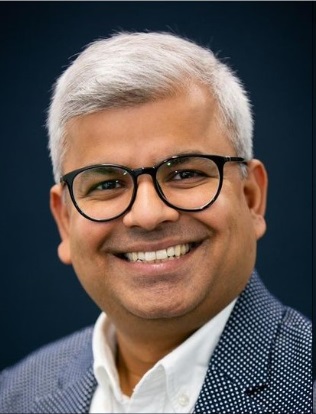Those who tuned in for Tuesday’s HPC + AI Wall Street event got a peak at the future of fintech and lively discussion of topics like blockchain, AI for risk management, and high-frequency trading, as told by a group of leading technical innovators as well as an SEC commissioner.
 Previously scheduled to take place at the New Yorker Hotel in Manhattan, HPC + AI Wall Street was shifted to a full day of virtual meetings and keynotes due to the COVID-19 pandemic. While many virtual events these days rely on taped content, HPC + AI Wall Street organizers Tabor Communication, BluSky, and Flagg Management elected to combine live presentations with a rich immersive experience to deliver an event unlike any other. In parallel with the main agenda, the inaugural Women in FinServ lounge was held as a place for women in financial services to network, learn together, and collaborate.
Previously scheduled to take place at the New Yorker Hotel in Manhattan, HPC + AI Wall Street was shifted to a full day of virtual meetings and keynotes due to the COVID-19 pandemic. While many virtual events these days rely on taped content, HPC + AI Wall Street organizers Tabor Communication, BluSky, and Flagg Management elected to combine live presentations with a rich immersive experience to deliver an event unlike any other. In parallel with the main agenda, the inaugural Women in FinServ lounge was held as a place for women in financial services to network, learn together, and collaborate.

Conference Chair Jem Pagán kicked things off with a reminder of the importance of fintech in our lives. And with one of every eight dollars spent on high performance computing (HPC) going towards the financial sector, according to Intersect 360’s Addison Snell, it’s tough to understate the impact that emerging fintech technologies will have in the years to come.
Take blockchain and cryptocurrencies like Bitcoin, for example. While these technologies have been around for nearly a decade and still have the air of novelty to them, ignore it at your own risk, said Sunayna Tuteja, the head of digital assets and blockchain for TD Ameritrade.

“Similar to AI and machine learning, blockchain is still in its nascency,” Tuteja said during her morning keynote. “We’ve come a long way, but we forget that it’s only 10 years old. Bitcoin was born at the end of the last big crisis. And this is the first time it’s being stress-tested, in a way.”
Under Tuteja, TD Ameritrade has embraced cryptocurrency as a potentially useful investment vehicle for its clients. Just as TD Ameritrade was born out of the emergence of discount brokerages, it sees cryptocurrency as another opportunity to help lower the barriers of entry for new investors. Those who don’t recognize the changes will be left behind, she suggested.
“The delta between novelty and normality closes rapidly,” Tuteja said. “It’s no longer [acceptable] to be apathetic or ignorant about this asset class. So learn, educate yourself, make your own opinions. But you can no longer shrug this off.”

The Fintech movement is helping to transform the traditional financial services industries in ways both big and small. One person who’s hoping to usher the industry through this transformation in a responsible way is Hester M. Peirce, a commissioner with the Securities and Exchange Commission (SEC).
“You obviously want the industry to take advantage of the latest technology,” Peirce told Chris Brummer, the co-founder of Fintech Beat, in a morning interview morning. “One fear that I have with a highly regulated industry is it’s easy for incumbents to say, hey, this is how we’ve always been doing things, and why should we change?…So I think that we are seeing some of that change actually seeping in.”
However, the reliance on a decentralized finance model, such as you get with blockchain and crowdfunding, does create some challenges for the SEC in its role as a market regulator, which has traditionally relied on gatekeepers to enforce regulations. “If you really do achieve decentralized finance, then you don’t have that intermediary to go to anymore, and I think that is a really challenging idea for us,” she said.
The SEC has adopted AI and machine learning technology to help it fulfill its mission, so is somewhat familiar with the emerging technologies driving fintech, according to Peirce, who seems to be one of the more forward-looking commissioners on the SEC panel. It’s unlikely that the decentralized cat will go back in the market bag, however, so Peirce supports the idea of pushing forward with emerging tech to achieve the necessary oversight.
“We need to recognize the fact that the reason our capital markets work is because knowledge and expertise and intelligence is dispersed and it’s different,” she said. “AI and ML…are built on this notion that information really is dispersed and the more of that that you can collect, the more you can see about what’s going on. But we sometimes as regulators forget there are a lot of smart people out there. They are just smart in different ways.”

In a presentation about crypto innovation and the future of money Shahin Khan, an analyst and founding partner at research firm, OrionX, discussed the ongoing changes in global currencies as crypto continues to emerge and mature.
One of the discussions going on in the crypto marketplace is that there may be an over-reliance on the U.S. dollar as a global standard today, and that could lead to new ways of looking at currencies. But that will take time, he said.
“It’s really hard to change those sorts of standards,” said Kahn. “Is there any alternative? Well, if there is one, it will have to emerge in new growth areas. It’s really difficult to replace USD where it has been so entrenched in terms of systems and regulations and established methods. If there is one, it’s likely digital currency, like a CBDC (central bank digital currency) style, SDR-like (special drawing rights), a basket for money, but that really isn’t happening. There’s discussion, but I think it’s a bigger lift than one may assume.”
Eventually, these transformations will occur with cryptocurrencies, just like they did with the industrial revolution, the mechanization of agriculture and other changes in culture and economies, said Kahn. So, what will help make that happen in the future?
“I think, without question, it’s ease of use,” said Kahn. “A cryptocurrency is just so hard to use even after all the efforts that people have put in. And there are some very, very good efforts to try to make things simpler. There are new wallets coming in, new exchanges that are really nice to use, but even they are not so easy to use. I think that’s the number one item I would focus on.”

As fintech spreads its wings, it generates data – a lot of data, according to Charles Fan, the co-founder and CEO of MemVerge. And much of that data will be moving very, very fast. The combination of the volume and velocity will stress the current generation of applications, including payment processing, trade monitoring, real time market data analytics, compliance, fraud detection, and high-frequency trading.
“By 2024, about one-quarter of the world’s data will need to be dealt with in real time,” Fan said during his presentation. “That means latencies that are in microseconds, or even nano seconds.”
To keep on top of that big, fast-moving data, fintech companies will need new infrastructure. In Fan’s opinion, the new class of persistent memory, or PRAM, such as Intel’s Optane technology, will give companies the capability to apply DRAM-like processing speeds but at disk-like scale.
“Persistent memory doesn’t replace [DRAM] but it extends the capacity of DRAM to lower the cost of the overall infrastructure,” Fan said. “Today on the street, you can get this persistent memory for half the price of DRAM. It’s a significant savings.”
A recurring theme during HPC + AI Wall Street was the existence of rapid change in technology. We are on the cusp of big changes in how we transact and deal with money, advises Ritesh Jain, the former COO and global head of digital technology foundation at HSBC. However, there’s a considerable amount of work to do before we fully realize the potential.
“Open finance is the future. Open banking is just the steppingstone, and it is opening up the doors,” he said. “Where it’s making a difference is consumers. We all are going to benefit from open finance. But it’s a long way to go, because the regulators and the governments need to work together.”

Jain advocates a simple and open framework to get everybody on the same page. That will be a challenge, however, as different governments have different ideas on what standards to focus on. “Every economy needs to have a very clearly defined regulatory framework,” he said. “Because it is not limited to payments. It’s moving to mortgages, financial services, pensions.”
Fintech will allow banks to go from being “just a dumb pipe” to providing a richer array of services. The banks that are at the forefront of this trend of establishing an open banking platform will have the advantage.
But there are considerable hurdles to achieving the open finance future, Jain said. “It is all driven by one thing: consumer rights. Who owns the data?” he said. “This is still a question in the different geographies, and that’s one thing to be considered by banks very seriously.”
Companies that want to leverage fintech and embrace the marriage of AI and financial services would do well to treat their clients’ data as if it were gold, advises Nick Curcuru, a data scientist with Advanced Analytics Partners.
“If you can show that, if you share data with me, I can provide you more value for it, that customer is going to trust you,” Curcuru said. “Show that I’m protecting your data and information as if I’m protecting you the person.”
The nature of data has changed, and fintech adopters that respect the new rules of the road will have the advantage, he said. “I’m going to tell you, flat out, those zeros and ones in the digital space that we now have are people,” he said. “It’s their digital persona. It is who they are.”
That relentless focus on treating clients’ data well is backed up by the data. “What you’re seeing is those companies who’ve embrace that are seeing 8 percent to 12 percent more growth in their business than those who haven’t embraced it,” said Curcuru, citing the recent study by Harvard Business Review.

In a session focused on the maturation of the digital asset class, Kristin Boggiano, co-founder and president of CrossTower, shed light on what she says is a contentious debate going on between centralized finance (CeFi) and decentralized finance (DeFi).
“Centralized finance in essence is taking the traditional financial infrastructure that applies to commodities, equities, etc. and replicating that for digital access, so we have counterparties that can be held accountable if there’s some aspect that doesn’t work, for example whether they get paid or not,” she said. “In theory, decentralized finance is when machines talk to machines and there is no human being. Someone has crafted a script, a platform that replicates the financial transaction, removing the entity in the middle, the counterparty, thus removing the counterparty credit risk.”
But there are potential risks, she added. “You could have a bug in your script; someone could overcome the decentralized nature of it and overtake it,” she said. “There are many interesting and innovative aspects of decentralized finance that we need to embrace, but I have to emphasize the ‘in theory’ part, because most of the ones I’ve observed, they have coders that are getting together, they have CEOs, they are hiring marketing people, and the question is: is it actually decentralized?”
Boggiano believes DeFi has the potential of creating and innovating in payments in ways we can’t foresee yet, like the iPhone. However, when you’re dealing with money, there are always bad actors. Nevertheless, she sees a path forward for DeFi in CeFi. “There is a movement for that right now, and that makes a whole lot of sense. This is our industry and we want it to be safe,” she said.
Ahead of the virtual event party featuring break-out sessions to stimulate discussion on the topics of the day, the Women in FinServ lounge, sponsored by Intel, concluded with a talk from Trish Damkroger, a vice president with Intel’s Datacenter Group. Damkroger emphasized the importance of corporate culture and inclusion and reviewed Intel’s ongoing efforts to boost diversity in the workplace.
The events of 2020 have been a real eye-opener for companies that didn’t think diversity, equality and inclusion were important before, Damkroger said. “The people entering the workforce are more focused on having an inclusive work environment,” she said. “We’ve cracked the tipping point.”


























































